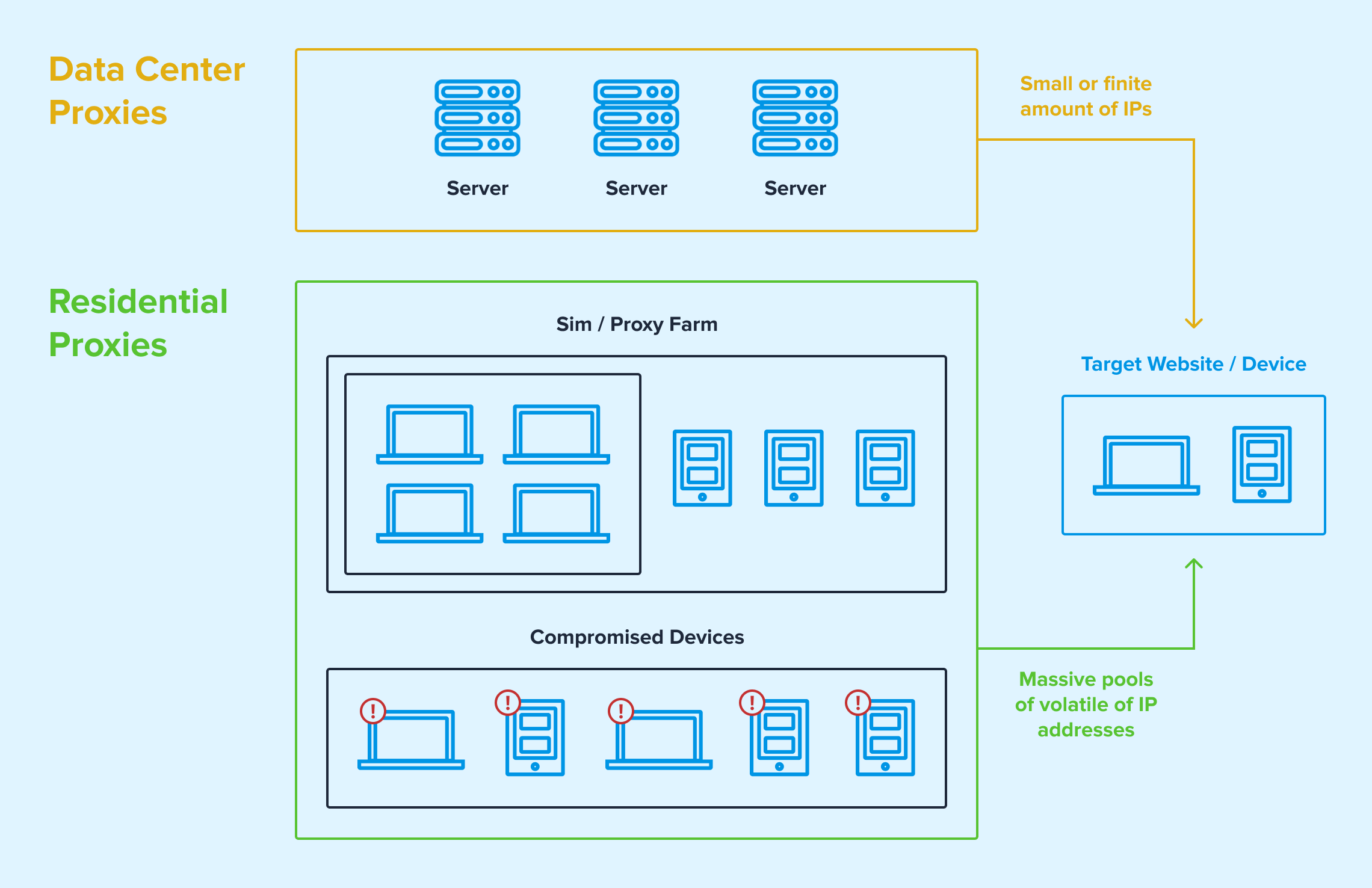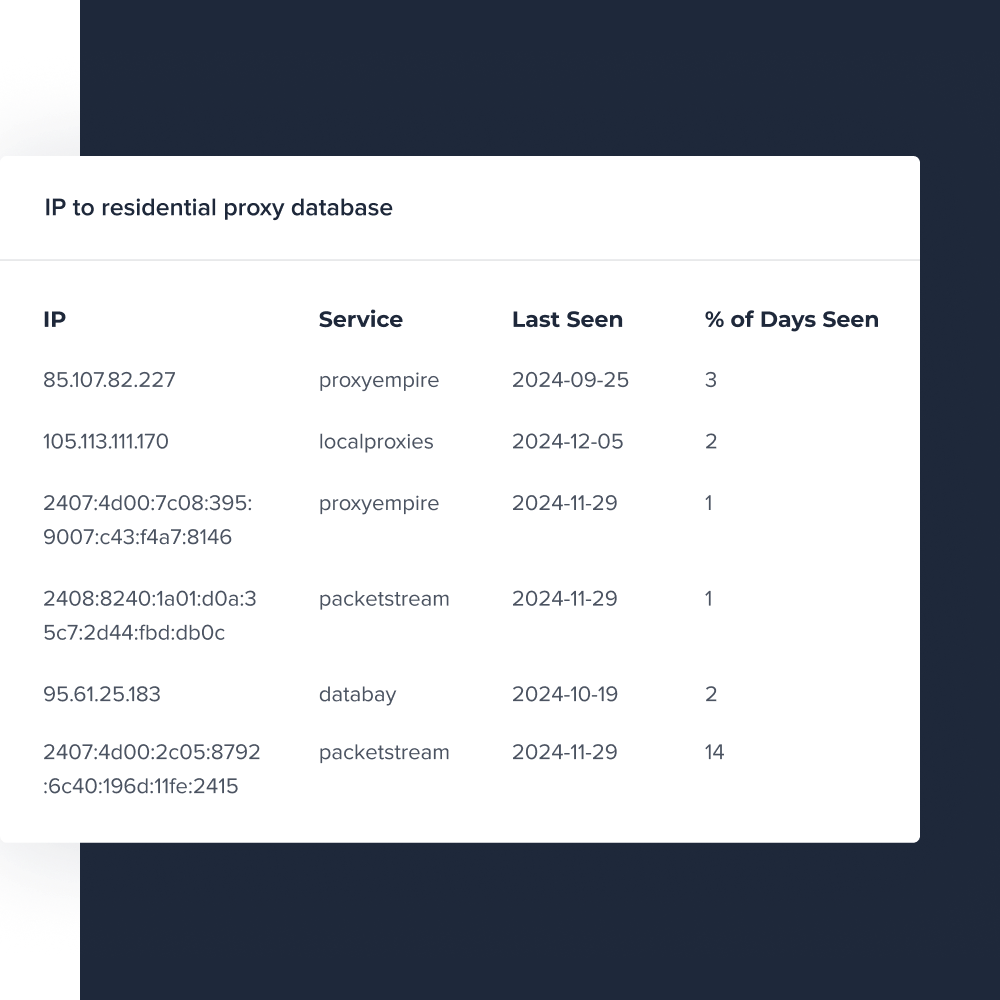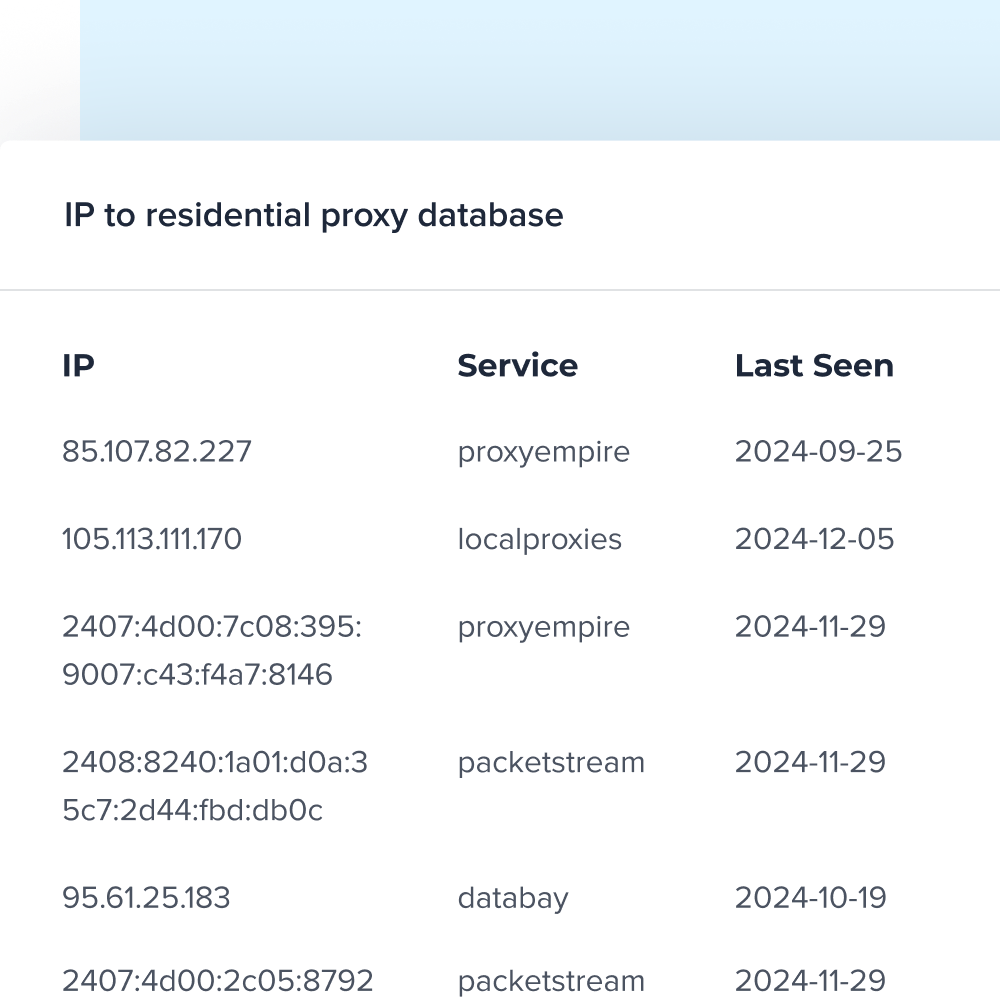Residential proxies, which route users’ activities through real, residential IP addresses, have become a hugely popular way for fraudsters to make their efforts appear more legitimate. By 2029, the global residential proxies service market value is projected to reach $842.2M.
That means the reputation and revenue risks associated with online fraud are greater than ever – and the means of correctly detecting those risks are more difficult.
Residential proxies are dual in nature. On the same IP, you can have a legitimate residential user and someone proxying through that IP. Oftentimes, the legitimate user isn’t even aware that their IP is being used for proxying because it’s being done through malware. In an effort to maintain their customer base, companies may unintentionally allow for fraud attempts by letting a residential proxy user slip through; conversely, they run the risk of banning transactions from a legitimate user whose IP is being proxied without their knowledge.
Companies that own anti-fraud products, especially financial fraud prevention, must strike the delicate balance between blocking fraud attempts while avoiding false positives that result in blocking legitimate users.
What Are Residential Proxies and Why Do Fraudsters Use Them?

Residential proxies access software on computers or mobile devices that give them temporary access to the internet. The software could be installed knowingly by incentivizing IP access, or it could be installed via malware attack.
One free VPN service is providing its services in exchange for access to users’ residential IP addresses – and many of the users are kids playing a VR video game. Other companies offer people passive income by sharing their unused bandwidth for “marketing research,” and that bandwidth is then sold to customers who want residential proxy services.
Although both residential proxies and VPNs anonymize user traffic, VPNs use stable data center IPs, which are consistently associated with VPN services. Residential proxy services use single IP addresses registered to companies or individuals and rotate in and out of service, making them much harder to detect because their traffic is sometimes legitimate.
That illusiveness, of course, is why fraudsters find residential proxies so appealing. Proxyware providers provide detailed levels of customization, allowing a user to buy a proxy based on a particular geolocation to align with the zipcode of, for example, a stolen credit card.
In ecommerce, some antifraud systems compare a customer’s billing address with their IP geolocation. If they match, the transaction goes through. Sites might also only allow transactions from IP addresses that appear to be from certain countries, for a variety of reasons including sanctions, licensing agreements, or marketing. Both measures are being circumvented by residential proxies.
Financial services are also at risk. Account takeovers of financial service accounts or loyalty programs are often aided by residential proxies. When asked how they’d respond to becoming victims of account takeovers, one quarter of consumers said they’d never use that business again.
The costs for both businesses and consumers are astronomical, and only growing larger as residential proxies gain popularity.
Residential Proxies’ Impact on Fraud Prevention Systems
These fraud attempts are notoriously difficult to identify with traditional fraud prevention tools. Because residential proxy traffic is sometimes legitimate traffic from a residential IP user, companies are put in a catch-22.
If they treat a transaction as legitimate, but it’s actually routed through a residential proxy, they’re at risk of reputational damage and/or revenue loss. But if the transaction is legitimate, and they block it, they’ve likely lost a customer for life.
That’s why accurate detection of residential proxies is so important – but it’s also a massive undertaking. The best way to identify residential proxies is to join proxy services and scan for all the IPs in use.
IPinfo has access to various services, as registered users, so we can directly verify the IP addresses being used as residential proxies. Our databases update daily for access to the most up-to-date, important information.
Our Residential Proxy Dataset provides crucial contextual information through specialized fields that help clients assess risk more effectively:
- IP address: Identifies the specific residential proxy IP being detected.
- Service: Names the proxy service provider associated with the IP, giving insight into the source of proxy traffic.
- Last_seen: Records the most recent date when the IP was observed functioning as a residential proxy, helping clients understand the recency of proxy activity.
- Percent_days_seen: A stability metric showing what percentage of days within the past 90-day period the IP has been active as a residential proxy, expressed as an integer from 1-100.
These fields offer powerful context for risk assessment. An IP with a high percent_days_seen value indicates consistent proxy usage over time, suggesting higher likelihood of being an intentional proxy rather than a temporarily compromised address. Combined with last_seen data, organizations can determine whether to block traffic, implement additional verification steps, or simply flag it for monitoring based on the stability and recency of proxy activity.
This additional context allows for more nuanced decision-making, reducing false positives while maintaining robust security against truly suspicious traffic. Unlike traditional binary detection systems, these metrics help balance security needs with legitimate user experience.
Add an Essential Layer of Security
Identify proxy-driven traffic with IPinfo’s residential proxy dataset and improve your risk management capabilities.
Residential Proxy Detection Use Cases

Financial Fraud Prevention
Financial fraud prevention products rely on various signals to detect fraudulent transactions, and residential proxy detection enhances their ability to identify sophisticated fraud attempts. They can implement a tiered risk assessment approach where transactions originating from residential proxy IP addresses receive higher scrutiny. The percent_days_seen metric can be particularly valuable in risk scoring models – higher percentages indicate more consistent proxy usage, suggesting a higher risk of fraudulent activity. Rather than outright blocking these connections, businesses can implement step-up authentication or additional verification steps for high-risk transactions, reducing both fraud losses and false positives.
Ad Fraud Prevention
Ad platforms lose significant revenue to fraudulent impressions and clicks generated through residential proxies. With residential proxy detection, these platforms can identify and filter out bot-driven traffic that appears to come from legitimate residential connections. The service field helps identify which residential proxy networks are most frequently associated with fraudulent activity and clickfraud campaigns, allowing for targeted countermeasures. By differentiating between legitimate user traffic and proxy-driven manipulation, ad platforms can provide more accurate metrics to advertisers and improve campaign performance while preventing revenue loss from fraudulent activity.
Account Security and Fraud Detection
Account security solutions benefit significantly from residential proxy intelligence when protecting against account takeovers and unauthorized access. By analyzing both the last_seen and percent_days_seen metrics, these systems can implement adaptive authentication measures proportional to the risk level – requesting additional verification like device confirmation or behavioral analysis when login attempts come from residential proxies with high stability scores. This layered approach helps security teams balance strong protection with minimal friction for legitimate users, addressing the critical challenge of distinguishing between genuine customers and malicious actors using residential proxy networks.
Ecommerce Fraud Protection
Ecommerce platforms face sophisticated fraud attempts using residential proxies to mimic legitimate customer behavior. By incorporating residential proxy data, particularly the service and percent_days_seen fields, these platforms can implement nuanced security measures when suspicious patterns arise. For example, when high-value purchases are attempted from IPs flagged as residential proxies, especially those with high stability metrics, the system can require additional verification like SMS confirmation or secondary authentication. This approach protects against fraud while preserving the customer experience for legitimate users who may unknowingly share networks with proxy traffic.
Data Analytics Integrity and Bot Mitigation
Organizations relying on accurate web analytics and market intelligence need to filter out proxy-driven traffic that skews metrics and corrupts business intelligence. By identifying and segmenting traffic from residential proxies, companies can achieve cleaner datasets for analytics, ensuring more reliable insights into genuine user behavior. Additionally, for websites targeted by scraping operations, the residential proxy dataset helps detect and manage bot activity that might otherwise appear as legitimate residential traffic. This protection is especially critical for businesses where data integrity directly impacts strategic decision-making and competitive positioning.
The Evolving Landscape of Online Fraud
Residential proxies have become a powerful tool for fraudsters, allowing them to disguise their activities as legitimate and evade traditional fraud detection methods. Their ability to mimic real users makes them a preferred choice over VPNs, posing a significant challenge for fraud prevention teams in the ecommerce and financial services industries.
Product owners and fraud prevention teams must stay ahead of these ever-evolving threats by leveraging dynamic detection strategies and continuously updating their data, which is why collaborating with an IP intelligence provider like IPinfo is critical.
Protect your business with accurate, real-time IP data. Our residential proxy detection data helps identify residential proxies, detect suspicious activity, and strengthen your fraud prevention efforts. Contact us today to learn how our solutions can help you stay ahead of evolving threats.
Detect Residential Proxies with Accurate IP Data
Add a critical layer of defense to your fraud prevention and security workflows.
About the author

Augustin works with top companies in managed detection and response and cybersecurity risk management, helping them deploy IP data solutions that improve responses and enhance intelligence.


